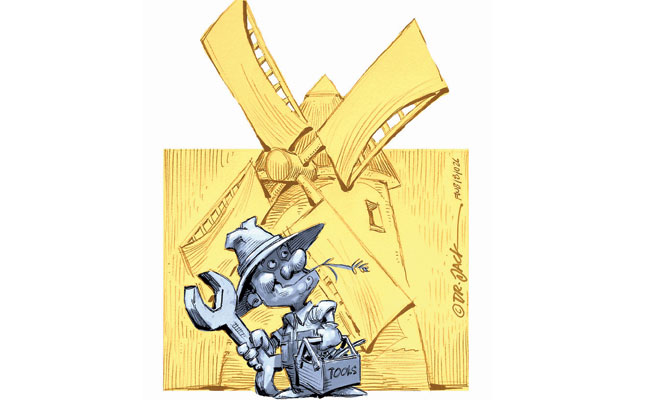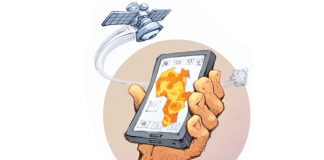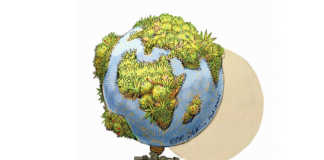
Photo: Dr Jack
Agriculture is the focus of many political and public debates. Young leaders in agriculture need to take the lead in determining our future – it is as simple as that.
Threats and speculations on the sector’s future abound; it is now more important than ever to debate, negotiate and participate in discourse, and offer arguments and counter-arguments effectively.
Unfortunately, this is not and has never been a well-developed skill among farmers, and particularly not when debate takes place over language and culture boundaries.
But South Africa’s farmers have no choice: there is no longer another option but to develop these skills for their own survival and success as well as that of the sector.
As the Chinese proverb has it, ‘When the winds of change rage, some build shelters, while others build windmills’. Over the past six years I have met and worked with many young farmers who have courage and big hearts.
It has been a joy for me to experience the talent, faith, optimism and hope they carry within them. I have been astonished at their development as leaders in the programmes presented and it has led me to the conclusion that the self-development of young farmers is key to our future prosperity and stability in South Africa.
A healthy mind in a healthy body
Agriculture is essential to our economic stability. A stable, growing sector is critical to regaining the trust of national and international investors, for job creation, and for food security in South Africa as well as across our borders.
It is vital for regional development, our international image, stability and growth in the financial sector, and, most importantly, nation-building.
This is possible if each young farmer, like a seed, receives fresh water and nutrients (new knowledge and skill), and works at being a whole, balanced, integrated person.
To grow and develop requires ‘time competence’. This means understanding which life stage you are in, and your development in relation to it.
Then you will be able to withstand these winds of change. Young farmers who are well-balanced, ‘whole’ people have the foundation to collectively lead agriculture to a new dawn.
To be personally whole means that you are strong internally through valuing and practising spirituality (religion), developing emotionally, being clear on values, and knowing who you truly are and what makes you happy.
Personal wholeness also means taking care of the rational mind through learning, living mindfully, and reading, which is too often neglected.
Young farmers cannot do this alone because, like everyone else, they are social beings who need to look after their relationships with their life partners, family members, work colleagues and members of the community.
These relationships must be cherished, and therefore deserve active involvement and dedicated time.
A whole person values work. This means contributing to the economy through work at home or on the farm, performing as part of the productive economy. In challenging times this can only be done if young farmers do not give up hope and remain optimistic.
We have all heard that a healthy mind lives within a healthy body. This is true. It means that a whole person, besides being internally, rationally and socially whole, must also look after his or her physical well-being, health, habits, diet and fitness.
An unfit, overweight person struggles with the other dimensions of wholeness.
The fertiliser or feed of wholeness is recreation. The individual who invests in entertainment, rest, cultural activities, vacation and play, generates the energy needed for inner, social, work and physical wholeness.
This is a major challenge for farmers and is often neglected.
One of the special privileges that farmers have is to be entrusted with nature. They work with soil, water, fauna and flora. A whole, integrated person looks after the environment.
The farmer who takes care of nature, natural resources and all material things is a whole farmer.
Society relies heavily on farmers to do just that and show the rest of us the way in these perilous times, when our planet is trying to cope with the demands made on her every day.
To lead a whole, integrated life is a prerequisite to learning and developing, but what would motivate learning?
Optimism paired with hope, constant curiosity, having a dream, and possessing the drive to make a difference: these are the important prerequisites for learning.
This means that as a young farmer, you should have personal ambitions and dreams, as well as keeping focus on the core purpose of being the leader of an enterprise.
This will make learning, accumulating knowledge and eventually gaining wisdom the core of your existence. In the words of legendary US actress Lillian Gish: “A happy life is one spent in learning, earning, yearning.”
Developing together
I realise that farmers have special challenges. It’s tough to learn alone; access to learning material may not be easy, with educational institutions being far away.
However, making time for learning is a universal challenge. My advice is to learn with and from others, especially from more experienced, seasoned farmers.
Develop together and build new social groups, including across language, cultural and gender boundaries.
Other ways of learning include taking part in formal training programmes, studying, and undertaking e-learning (which is highly accessible and affordable). Finally, read, read, read as widely as possible and not only in your mother tongue.
This requires choosing which opportunities to pursue and which to decline, rather than simply reacting to emergencies. The process includes technology management, the building of support networks at work and at home, and joining forces with partners.
It requires you to draw up a list of skills for short-term benefit and long-term yield, and to invest time in developing and learning, as well as in building networks.
Evaluate individual successes and remember that success evolves over time. As Abigail Adams, the renowned wife of the second president of the US, said: “Learning is not attained by chance, it must be sought for with ardour and diligence.”
The immense benefits of this will include:
- A happy, energised and stimulated you.
- Sound relationships, with the added benefit of learning with and from each other.A positive ripple effect on your farm, your community and in the broader South Africa.
- Financial growth and benefits, personally and for those in a relationship with you.
- Positive, enriched relationships over farm borders and cultural boundaries.
- Continual personal development and improved thinking ability, with the added advantage of being able to debate and state personal and shared views.
You are a future leader in the most important sector in South Africa’s economy, My appeal to you is to be brave and take the lead in determining our future.
You have an important role to play in healing our land and taking us forward.
The views expressed in our weekly opinion piece do not necessarily reflect those of Farmer’s Weekly. Email Dr René Uys at [email protected], or visit thinkingfusion.com.











